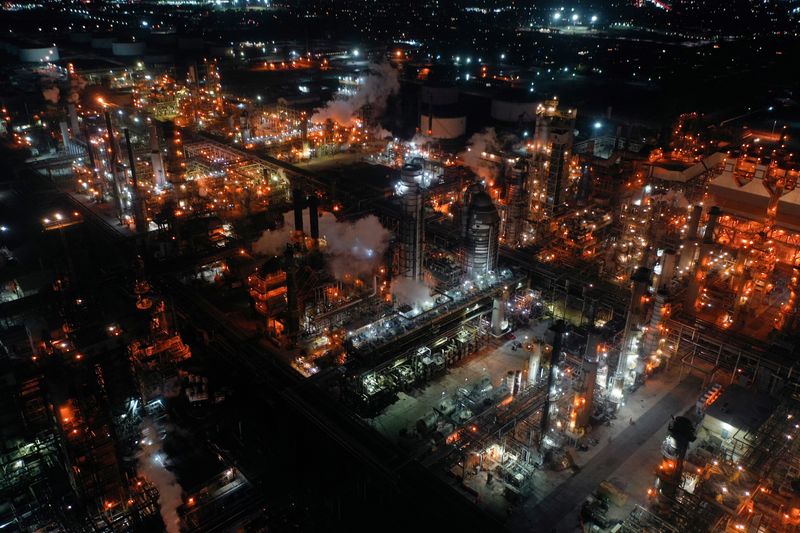By Shariq Khan
(Reuters) - U.S. oil refining margins on Tuesday hit a three-month high and are likely headed higher, analysts said, as unplanned refinery outages weigh on already-tight fuel supplies.
The outages have pushed up gasoline prices in Texas and Oklahoma this year ahead of what is expected to be a heavier than usual turnaround season for refineries. The rising prices and margins are unusual for this time of year, when travel falls.
The crack spread, a key gauge of refiner profits that measures the difference between crude oil prices and selling prices of finished products, touched $42.41 on Tuesday, the highest since October. The five-year January average is $15.56, an analysis of Refinitiv Eikon data showed.
Average gasoline prices in Texas hit about $3.07 a gallon on Tuesday, up almost 44 cents from a month ago, according to the AAA motor group. Motorists in Oklahoma also are paying about 45 cents more, at $3.13 a gallon, AAA data showed.
A diesel producing unit at PBF Energy (NYSE:PBF)'s Chalmette, Louisiana, refinery was shut following a fire on Saturday. It could be out for at least a month. Exxon Mobil (NYSE:XOM) said Monday it will perform planned maintenance on several units at its Baytown, Texas, petrochemical complex.
The ongoing refinery maintenance season could be much lengthier than usual, with many U.S. Gulf Coast refineries still running below capacity after Winter Storm Elliott knocked out some 1.5 million barrels per day of refining capacity in December. A Suncor refinery in Commerce City, Colorado, has remained offline since the storm.
A lot of overhauls were also delayed by the pandemic, and refiners are now planning twice as many overhauls this spring than usual, putting more pressure on fuel supplies.
Fuel inventories are low relative to historical levels, "so there is little margin for error," said Rob Thummel, portfolio manager at Tortoise. U.S. gasoline inventories are at about 10% below normal and diesel around 20% below normal.
A coming ban on Russian seaborne fuel cargoes will place new calls on U.S. refined products, said Ole Hansen, head of commodity strategy at Saxo Bank.
"Supply of diesel to Europe from the U.S. and the emerging refinery hub in the Middle East may make up some of the missing barrels from Russia, but a shortfall seems likely," Hansen said.
(This story has been refiled to insert dropped word in the headline)
